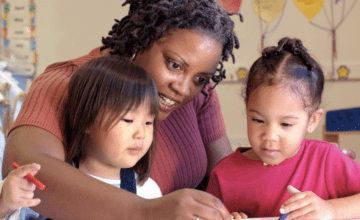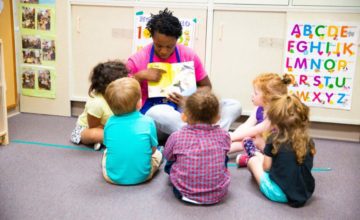This handout is based on findings from a report From Neurons to Neighborhoods: The Science of Early Childhood Development from the National Academy of Sciences that examined child and brain development in the early years. The information we offer is age-specific, summarizes key findings from the report, and suggests how you might be able to use these key findings to nurture your own child’s healthy development.
Key Findings
Findings from the From Neurons to Neighborhoods: The Science of Early Childhood Development include:
- Your relationship with your child is the foundation of his or her healthy development.
- Your child’s development depends on both the traits he or she was born with (nature), and what he or she experiences (nurture).
- All areas of development (social, emotional, intellectual, language and motor) are linked. Each depends on, and influences, the others.
- What children experience, including how their parents respond to them, shapes their development as they adapt to the world.
How Development Looks in Everyday Life
This shows how all areas of Carlos’s development are linked and how his mother’s response encourages his healthy development.
Sixteen-month-old Carlos wants juice and his mom doesn’t know it. He is sitting in his high chair banging his cup and pushing the cartons of milk away when his mom, Marta, tries to pour some for him. They both are very frustrated. Marta takes Carlos out of the high chair and announces lunch is over. Carlos marches to the refrigerator and starts banging on the door. Marta is about to tell him to stop banging, but instead asks, “Do you want to open the refrigerator?” Carlos smiles and shakes his head “Yes!” Marta opens the door and Carlos points to the drinks on the shelf. Marta then points to each carton and asks, “Is this what you want?” Carlos shakes his head no until he gets to the juice. Then he jumps around and says, “juju!!” Marta pours him juice as he happily plops himself on her lap.
Carlos has learned to count on his mom as someone who helps him as he struggles to communicate what he wants. This signals strong social and emotional development. He uses his intellectual ability to make a plan to get what he wants, and uses his motor and language skills to carry out the plan as he walks to the refrigerator and bangs, points and uses sounds to get his message across.
Relationships are the foundation of a child’s healthy development.
Despite her frustration, Marta takes the time to watch and listen to Carlos. This encourages Carlos to feel like a good communicator and reinforces his sense of self-esteem by letting him know that he is worth listening and paying attention to.
Charting Your Child’s Healthy Development
The following chart describes many of the things your baby is learning between 12 and 18 months and what you can do to support your child in all areas of her development. As you read, remember that children develop at their own pace and in their own way. Understanding who your child is, what her strengths are and where she needs more support, is essential for promoting her healthy development. If you have questions regarding your child’s development, ask your pediatrician.



